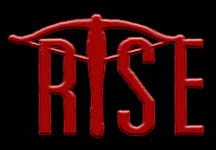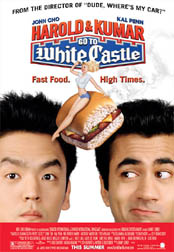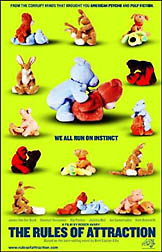 While writer-director Sebastian Gutierrez and stars Lucy Liu and Michael Chiklis (interviews HERE, HERE and HERE) were occupied with actually shooting scenes during my visit to the set of the Ghost House horror-thriller Rise, I shot the breeze with the man behind the scenes, producer Greg Shapiro (also of Harold & Kumar Go To White Castle).
While writer-director Sebastian Gutierrez and stars Lucy Liu and Michael Chiklis (interviews HERE, HERE and HERE) were occupied with actually shooting scenes during my visit to the set of the Ghost House horror-thriller Rise, I shot the breeze with the man behind the scenes, producer Greg Shapiro (also of Harold & Kumar Go To White Castle).
We talked about the scenes being filmed (Chiklis’ cop Rawlins has Lucy’s “killer” Sadie in custody, but not for long), and the cameos in the movie, which I won’t reveal. Our discussion went off on all sorts of tangents about the new studio PG-13 focus, how MPAA edits are determined regarding drug use and how Dude Where’s My Car? was chiseled down from an R-rated movie, the possibility of the DVD market reaching maturity, etc. We also discussed his other projects, but we did eventually get back to the movie at hand.
Q: How did you go from Harold & Kumar to Rise?
Shapiro: Harold & Kumar was financed by Mandate, the company that’s financing this. Ghost House is a partnership between Mandate and Sam Raimi and Rob Tapert. Mandate does their own things, they’re doing the Will Ferrell movie Stranger Than Fiction right now, and I’d had a relationship with them from Harold & Kumar.
Q: How did you get involved with Harold & Kumar in the first place?
Shapiro: I’d gotten the script at the same time Nathan Kahane at Mandate had gotten the script, and we just decided to all partner up on it. It was an available spec script that had been passed on by every studio, they said there was no way they were making a movie with an Asian and an Indian as the two leads. In any case, I started working on that with them and had a really good experience. They actually had Rise in development, and I had a relationship with Sebastian, so we decided to all work on Rise together.
Q: Had you worked with him before?
 Shapiro: No, I’d just known him as a writer. We’d talked before about doing a project together that never happened.
Shapiro: No, I’d just known him as a writer. We’d talked before about doing a project together that never happened.
Q: Is Rise the sort of thing you want to do, genre material?
Shapiro: I’ve always liked horror. I wouldn’t consider myself a diehard horror fan, but I like doing different kinds of movies, an eclectic, small body of work.
Q: You’ve worked on Bret Easton Ellis material as well, right?
Shapiro: I did Rules of Attraction, and Glamorama with Roger Avary, we’re still working on that.
Q: Rules of Attraction was pretty brave as far as direction.
Shapiro: I think it polarized a lot of people. A lot of people didn’t know what to make of it. I think that’s what you should set out to do when you make a movie, try to provoke a response. Whether it’s a positive response or negative response, as long as they’re reacting.
Q: I suppose Ellis’ work is inherently like that.
Shapiro: Inherently it’s difficult to connect to an audience because he chooses not to redeem all of his characters. It’s fascinating to read in a book, but it becomes problematic when you adapt it for the screen. I think American Psycho is actually a really fun movie, and I think Roger Avary did an incredible job cracking Rules of Attraction, which does not have a strong narrative in the book. It’s not just stream of consciousness, it’s three different characters interweaving. The script is actually written in reverse, the split-screen shot in the hallway with Shannyn Sossamon and James Van Der Beek, Roger has worked all that out before when he wrote the script. And the whole Kip Pardue European sequence was a page and a half monologue in the script.
Q: Didn’t you actually go and shoot that for 20 days?
 Shapiro: Yeah, it was Roger, Kip and myself and we went and shot for 14 days, through 12 countries. It was fantastic. We kind of had to prove to the studio we could do it. We said “Give us a nominal amount of money and two cameras,” and we lived frugal like college students. We just stayed at a little better than hostels. [Laughs] It was a lot of fun. He ended up writing the text based on what happened, so everything you see in that montage actually happened. We went to the cities we knew we were going to visit and we just went and experienced whatever we experienced, then took all the footage and pared it down to a four-minute sequence and he wrote the text based on what happened.
Shapiro: Yeah, it was Roger, Kip and myself and we went and shot for 14 days, through 12 countries. It was fantastic. We kind of had to prove to the studio we could do it. We said “Give us a nominal amount of money and two cameras,” and we lived frugal like college students. We just stayed at a little better than hostels. [Laughs] It was a lot of fun. He ended up writing the text based on what happened, so everything you see in that montage actually happened. We went to the cities we knew we were going to visit and we just went and experienced whatever we experienced, then took all the footage and pared it down to a four-minute sequence and he wrote the text based on what happened.
Q: So what’s next for you?
Shapiro: I’m working on The Rum Diary, the Johnny Depp thing with Hunter Thompson. The book was written by Hunter when he was 23. It’s written as a novel but it’s very autobiographical. There are two characters, both of whom are facets of his own memory. Bruce Robinson is directing.
Q: How did you get involved in the whole bigshot
Shapiro: I started out working on a movie with Nick Nolte called
Q: So what else can you tell me about Rise? Beyond the logline, I mean.
Shapiro: What do you know about it?
Q: Just that Lucy plays a reporter who wakes up in a morgue, then goes on a bloody rampage seeking revenge.
Shapiro: That’s it! That’s all you need to know… until you see the rest of the movie. [Laughs]
Q: And this is theoretically the first R-rated Ghost House movie?
Shapiro: It is. I’m sure there’s some controversy in there somewhere. There’s a lot of talk – there was an article the other day about Wedding Crashers and R-rated movies. With this movie, Sebastian when he first wrote the script said he wanted to make a hard R-rated horror movie and he had no desire to make anything other. And Ghost House and Mandate said great, if that’s what you want to do, that’s what we’ll do.